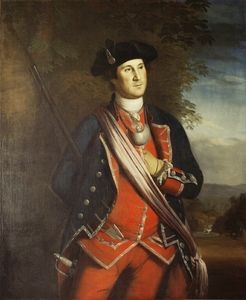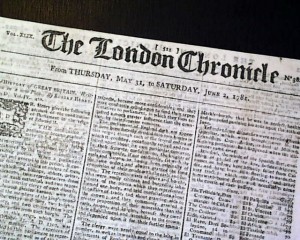It was no surprise that European nations were weary of the newly formed United States of America in the aftermath of the Revolutionary War. No one knew how to deal with a nation that repelled it’s British usurpers. Based on the various interpretations of the Articles of Confederation, one would assume that the newly established government would topple over before it even began it’s job. The government would not be granted the right to tax until the creation of the Constitution. It was in the midst of this drowning state that Thomas Jefferson pursued trade agreements with the European nations. On his expedition to Europe in 1787, Jefferson realized just how much the rest of the world thought about the new playground of the west.
To say that “opinions varied” would be a significant understatement. According to foreignpolicy.com, European newspapers suggested that America was in a state of uncontrolled chaos. European newspapers also claimed that state governments were collapsing, Congress held no power, and that the people were fleeing to Canada. If papers didn’t bash the state of affairs in America, they ominously predicted the threat that the loss would have on the future prosperity of Britain. They feared the fate of the remaining British colonies. They feared a future Britain contained to Ireland, Scotland, and England. How were they to get ahead of Spain and France when they lacked the significant resources that had been made available to them in the new world? Anecdotes predicting the future of Britain filled British newspapers. There was an overwhelming assumption among the British that their kingdom would collapse from the economic disadvantage. Ironically, these newspapers published this information halfway through Britain’s first Industrial revolution, in which the economy flourished and industry bloomed throughout England. The standard of living grew consistently throughout the country. The addition of the agricultural revolution increased the standard of living as well.

Depiction of George Washington as a young, British soldier in the French and Indian War. Source: http://images.rarenewspapers.com/ebayimgs/1.9.2013 /image050.jpg
The end of the revolution brought relief in Britain as well. Many English newspapers praised the establishment of the United States. One paper, the Westminster Chronicle called the Americans “bretheren”. Despite the destruction of Loyalist’s lives and property, the British still felt a connection to the newly found nation. After all, the nation was established by those who once lived under the same crown. For some British newspapers, the transformation was a welcome end to the hardships suffered by the colonists. One significant founding father was admired by many British papers: George Washington. Washington was declared as having “integrity” and was admired for his leadership by the British papers.
It is safe to assume that English papers practiced selective printing during the years preceding the revolution. Perhaps they could not imagine a stable state without an powerful monarchy. Perhaps they could not believe that a barbaric state composed of hardened criminals could stop the crown. One thing is certain: they did not receive the news from the Americas with open arms. It had to be twisted and manipulated to please the masses, many of whom lost their monetary investments in the new world. No American accomplishments were proudly proclaimed in European papers. They did not observe the application of revolutionary ideas and the establishment of America’s democratic foundations.


Leave a response